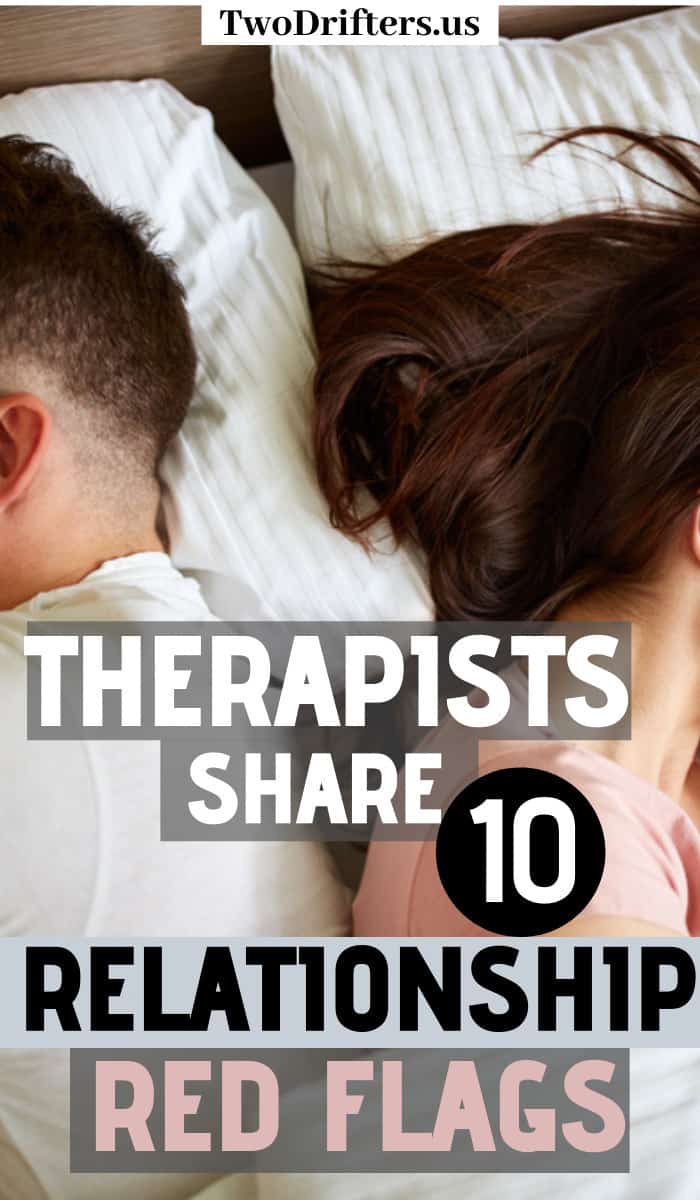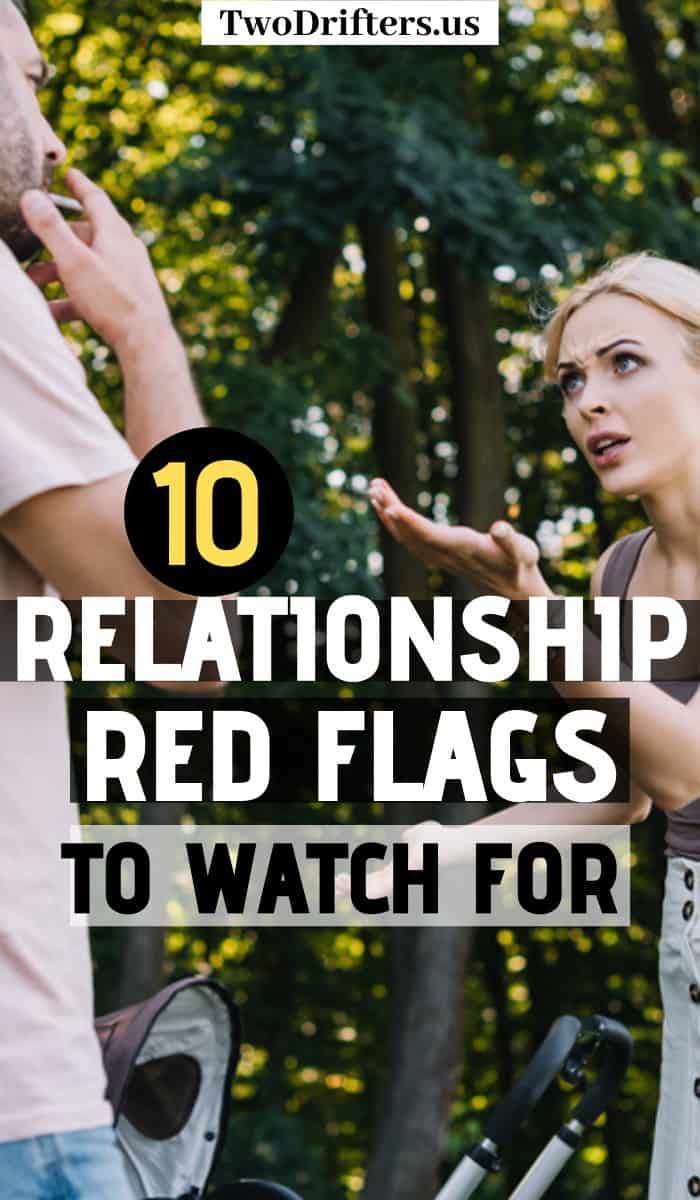This post may contain affiliate links. Read our disclosure page for full details.
Relationship red flags: those big, flashing warning signs that tell us something might be wrong with this situation. You would think that these would be easy to spot, and while many of them are more obvious than others, the truth is that red flags can actually be pretty tough to recognize. This is especially true in romantic relationships, and doubly true in new ones. At those times, it is incredibly easy to be blinded by infatuation, novelty, and excitement. It can be easy to overlook potential problems if you don’t know what to look for.
Fortunately, we’ve got your back, and we are going to help you know exactly what to keep an eye out for. We asked professional therapists, relationship coaches, and other experts to let us know what they think the biggest red flags in relationships are. There was plenty of agreement about which red flags and signs should sound the alarm for us as we consider potential or current partners.
And, while it’s super important to keep an eye out for early warning signs in relationships, it is vital not to forget that these issues can also emerge over time. This can be extra dangerous because we may spot a red flag in a relationship with a partner we’ve built a history with; someone we’ve grown to love.
Ultimately, being aware of these indicators is vital to helping us choose the right relationships: the ones in which we are with someone we can trust, and in which we are loved, respected, treasured, and treated with all the care and compassion we deserve in this life.
So, are there red flags in your relationship? Let’s dig in and see what the therapists have to say.
Feeling like you can’t be yourself
A good relationship is one in which you feel you comfortable to fully express who you are. If your relationship stifles some of who you are, or prevents you from expressing your own needs, this could be a bad sign.
Licensed Mental Health Counselor CJ Everhart says, “I always warn clients to check in with themselves- do you feel the need to keep certain things about yourself under wraps? Do you feel like you are keeping moments of discomfort or dislike around intimacy to yourself? These are major red flags that if unheeded- you can find yourself in a relationship where you aren’t able to be you and your needs may not be met. It’s major to feel you can show up as yourself and ask for what you need from the jump.”
Your partner doesn’t respect your boundaries
Boundaries are so essential in any relationship, romantic or otherwise. Someone who does not acknowledge or respect your boundaries is someone with whom you will likely encounter a great deal of conflict and pain, and you are likely not to feel respected or prioritized.
Psychotherapist and coach Emma Donovan suggests that “If you find your new love interest disregarding your decisions or pushing against sexual boundaries, it may be time to part ways. Boundary violations will only get worse.”
When a relationship is moving way too fast, way too soon
Have you ever been in a new relationship that seems to be moving at lightning speed? Suddenly you’re moving in together and making major future plans, and it’s only been 3 weeks! Is it time to back up?
Even though this whirlwind of emotion can sometimes feel good, it is mostly overwhelming and confusing. This can be one of the biggest concerns, therapists agree.
Sybil Cummin MA, LPC, ACS explains what this might look like.
“You just met, have had a couple of dates and your partner is already exclaiming you are his/her soul mate and are consistently pursuing the discussion of moving in together, marriage, and/or having children… He/she overwhelms you with compliments and gifts and makes it a point to have a public show of what an amazing partner they are.”
For some people, she says, “this warning sign is a tough one, because it feels amazing to be the center of someone’s world. However, this could be the initial stages of love bombing. This term is when someone uses the behaviors mentioned above to manipulate his/her partner to jump into a serious relationship. Once in, it can be really tough to get out.”
Big promises early on are another red flag of relationships, according to Rose Skeeters, LPC, “Beware of the partner that makes big promises and does not follow through. Big promises with big let downs can be a sign of impulsivity and manipulation.”
Absence of current relationships with family/friends
Does your boyfriend seem to have mysteriously few family members? Has your new girlfriend ever spoken of her friends to you? Sometimes, you might find yourself dating someone who seems to be a lone wolf. They rarely, if ever, mention social or familial connections. Is this a problem? Not necessarily, but it can certainly be indicative of one.
Sure, some folks are just less social than others, and that’s okay, but a lack of any close connections in someone’s life is a red flag. It may reveal that they have significant interpersonal difficulties, unable to create and sustain relationships with others. If they have family they don’t interact with, this could potentially be a sign that they have alienated themself or others, even from blood relations.
Past relationships: non-resolution
They ‘fight dirty’
While conflict is part of a normal healthy romantic relationship, it should always be good, productive conflict that moves things forward. We need to know how to fight well. This isn’t something may of us know how to do. Many couples have to learn how to “fight better,” figuring out how to best resolve conflict together in a way that is respectful and values compromise and solutions. This is hard, and it takes time, effort, and collaboration.
But what if you’re with a person who “fights dirty?” Maybe your new partner resorts to lots of cruel and mean insults, or uses techniques of manipulation or withdrawal. While these are not automatic red flags, if such things are occurring early on in a relationship, or if they occur with frequency and increasing intensity, they are not something you should ignore.
Rose Skeeters reminds us that “A new relationship should be fun, lighthearted, and explorative. You are both discovering more and more about each other and beginning to test the waters of vulnerability.”
While conflict may come up (it’s natural and normal) it’s important to be aware of how the conflict is proceeding. What do you hear? What are they saying? Do their words or energy seem out of place with what’s going on?
Skeeters says, “If an argument arises, be sure to pay attention to the fighting style of your new bae. Does your partner’s emotional intensity match the situation? Do they jump to accusations or threaten to leave you before talking things through? If you both disagree on whose friends you should chill with this Friday night and your partner shuts down completely or starts into a rage, accusing you of being selfish, consider cutting your losses. Intense emotions that do not match a situation and [behaviors like] being quick to blame you or write you off are signs of a deeper issue.”
Controlling behaviors
A controlling partner is one of the clearest deal breakers, but often those in such a situation don’t realize that it is happening.
Such behaviors can be subtle, but they may include telling you how to dress, gatekeeping who you can or cannot talk to, making decisions for you or making plans for you constantly without consulting you, dismissing your opinions, or disregarding your privacy. If you’re being told how to live your life, with little to no regard for your own opinions, this is not a great sign.
What about when behaviors are not directly controlling? Maybe your partner isn’t giving you instructions or rules on how to live or telling you what you can and cannot do. Whether or not the control is overt or not, these can still be problematic behaviors. Watch out for frequent “put-downs” or derision regarding your choices. There may be subtle insults or snide comments about what you’re wearing or who you’re going to hang out with. If he/she has you second-guessing your own decisions or questioning your own choices, look closely at what’s happening.
While not overly “controlling,” this behavior still demonstrates an inability to respect your decisions and likely indicates a desire to control your actions.
Inability to take responsibility for their actions
Raffi Bilek, couples counselor and director of the BaltimoreTherapy Center shares this red flag: a person who cannot take responsibility for the things they do.
“Nothing is ever their fault. Somehow any issues in the relationship are because of you. Even problems clearly caused by their actions somehow get turned around so that the finger is pointed at you. This is a major red flag for abuse. If they cannot ever accept responsibility for having done something wrong, it’s not a good sign.”
This is different than simply being stubborn and hard-headed. Mature adults in healthy relationships know how to assume responsibility and accept blame when it is due.
They are secretive
Do you feel like you don’t truly know your partner? Are they a constant enigma and mystery even after months or years together? This could be a likely sign that something is amiss.
Openness and honesty are hallmarks of a flourishing relationship. If they seem markedly absent from yours, you may need to dig deeper to figure out what’s going on.
Abuse of any kind
The most alarming red flag in a relationship is any type of abuse. This is the type of thing you should definitely be aware of from the get-go. “Ignoring red flags in the beginning because you want your relationship to work will cost you later. “ says trauma-informed psychotherapist Christine Scott-Hudson of Create Your Life Studio in Santa Barbara.
Scott-Hudson clarifies signs of abuse for us:
“Examples of Physical Abuse are: pushing, shouting over you, screaming in your face, physically taking things away from your grip, grabbing you tightly, squeezing, pinching, hitting, slapping, punching, biting, kicking, shoving, forced sexual contact, restraining, and destroying your property.
Examples of Verbal and Emotional Abuse are: any negative or disparaging comment about your appearance, including weight, skin color, shape, size, hair, teeth, clothing, abilities, genitals, etc, any put-downs about your intelligence, brain, mind, mental health, etc., any insults about your worth or value as a human being, all of these types of repeated verbal assaults could lead you to feel not good enough, not smart enough, and/or not loveable, repeated criticisms about personal vulnerabilities you’ve shared with them in the past, such as abuse histories, phobias, fears, or sensitive information about your past.”
Finally, she writes this, which is essential for anyone encountering possible abuse:
“If your partner has a pattern of abuse towards you, please get help. Find a supportive Psychotherapist who understands and who specializes in domestic violence. You need a private, separate space of your own to examine and look more deeply into the unhealthy dynamic, including your own personal family history, underlying vulnerabilities, and possible codependency, etc., so that you can begin to heal and move forward in a healthier manner.”
Psst! You might also want to check out these similar articles on our site:
- 7 Warning Signs of a Toxic Relationship to Watch For
- 10 Common Signs You Might be Dating a Narcissist
- 6 Characteristics of an Emotionally Unavailable Man
- 101 Toxic Relationship Quotes to Remind You You’re Not Alone
- 9 Signs He’s Not the One
- How to Deal With Anxiety in Relationships
- Top 10 Relationship Green Flags for a Healthy Relationship

Amy Hartle is the author of Do You Love Me? How To Stop Seeking Reassurance in Relationships, a book on reassurance seeking and relationship anxiety. Both her book and this blog are born of personal experience; Amy shares expert relationship advice from the lessons learned during her own 10+ years with her husband, as well as couples travel tips and romantic getaway recommendations, all gleaned while traveling the world together.






